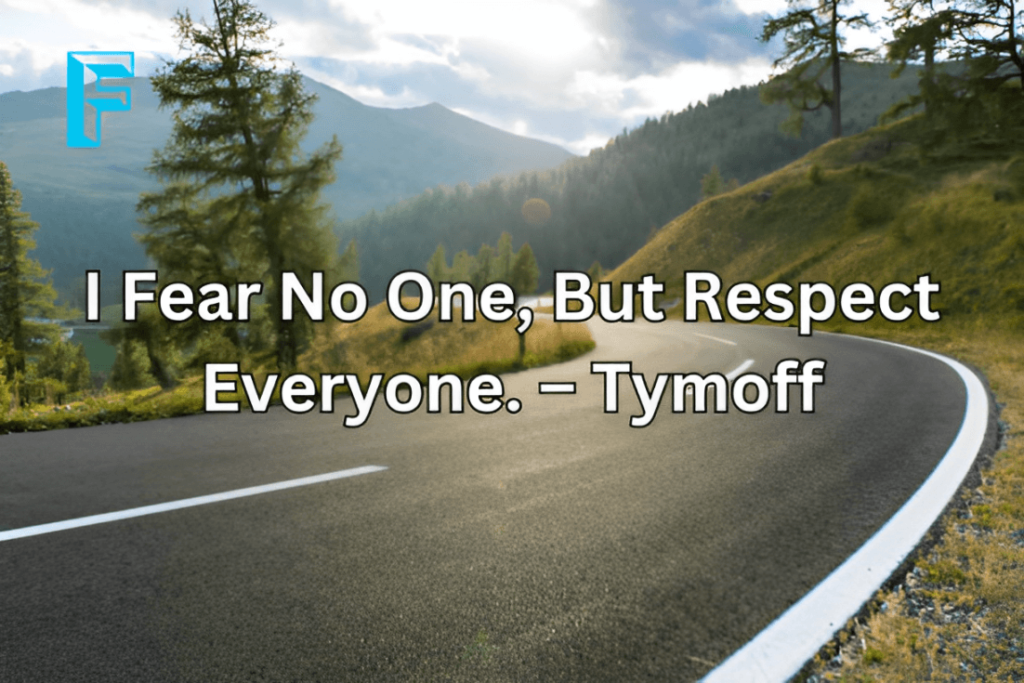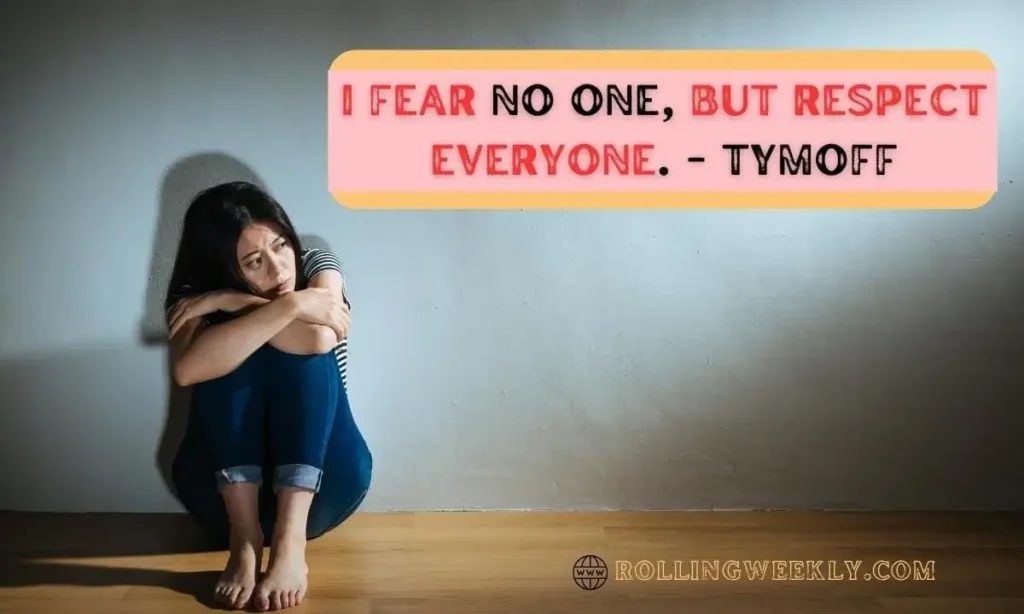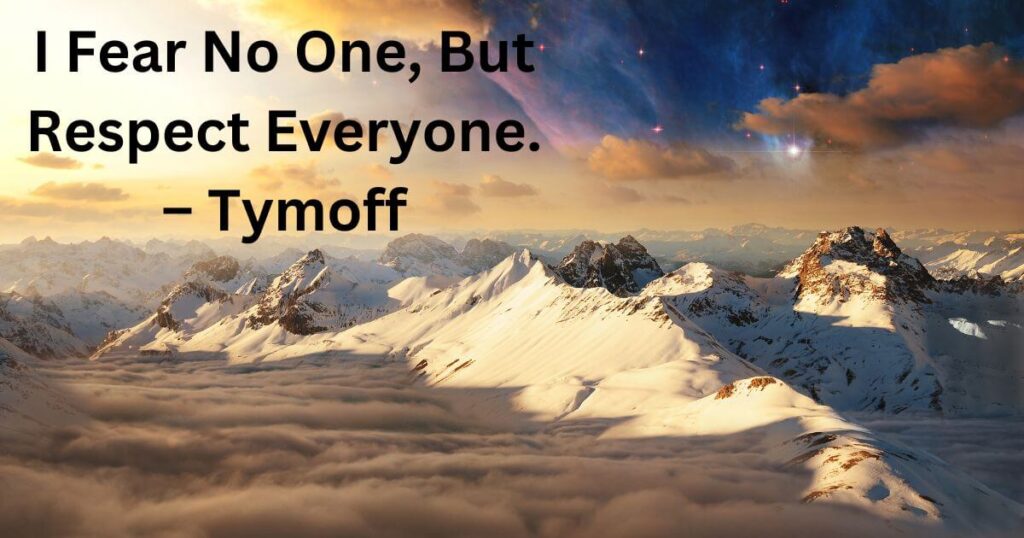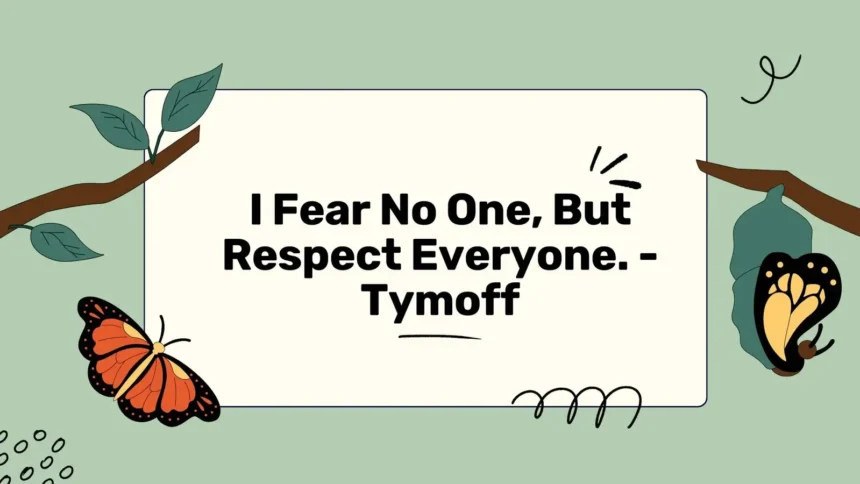The phrase “I fear no one, but respect everyone. – Tymoff” encapsulates a profound philosophy of life. At first glance, it appears simple, but a deeper exploration reveals a balance between inner strength, humility, and wisdom. It reflects the ideal of self-confidence tempered with respect for others—a harmonious blend that is both empowering and ethical. This philosophy is increasingly relevant in today’s fast-paced and often divisive world, where individuality and mutual respect can sometimes seem at odds.
Understanding the Philosophy
1. Strength Without Arrogance
The phrase begins with “I fear no one,” which signifies courage and self-assurance. However, this courage does not stem from recklessness or arrogance but from a solid understanding of one’s abilities, values, and principles. It encourages us to stand firm in adversity, face challenges head-on, and not be intimidated by others, regardless of their stature or power.
Fearlessness here is not about being devoid of fear but about not letting fear dictate one’s actions. It is a call to embrace challenges, grow through adversities, and develop resilience.
2. Respect Without Submission
The second part of the statement, “but respect everyone,” introduces an essential counterbalance to fearlessness. While fearlessness could easily lead to arrogance if unchecked, the commitment to respecting everyone ensures humility. Respect is not about agreeing with or submitting to others; it is about acknowledging their intrinsic worth, perspectives, and experiences.
This perspective aligns with the principle of mutual respect, foundational to healthy relationships and societies. It emphasizes that while we may not always agree with others, we should honor their humanity.

Historical and Cultural Roots
The essence of this philosophy has roots in numerous cultural, philosophical, and spiritual traditions:
- Stoicism: Ancient Stoic philosophers like Marcus Aurelius and Seneca preached self-mastery and resilience. They believed in focusing on what one can control and not being perturbed by external forces—a principle echoed in the fearlessness described here.
- Eastern Philosophy: In Buddhism and Taoism, humility and respect for others are central tenets. They teach individuals to see themselves as part of a greater whole and to respect all forms of life.
- Modern Leadership: Great leaders like Mahatma Gandhi and Nelson Mandela embodied this principle. Their fearlessness in the face of oppression was matched by their respect for adversaries and allies alike.
Practical Applications of the Philosophy
Living by “I fear no one, but respect everyone. – Tymoff” is not merely about adopting an attitude; it requires actionable steps in daily life:
1. Cultivating Inner Strength
- Self-Awareness: Understanding your strengths, weaknesses, and values is the first step. Self-awareness breeds confidence, which is essential for overcoming fear.
- Mindset Training: Techniques like mindfulness and visualization can help build resilience against fear.
- Facing Challenges: Actively seeking challenges helps develop the muscle of courage. Each challenge overcome reduces the grip of fear over your life.
2. Practicing Respect in Interactions
- Listening Actively: Truly hearing someone’s perspective, even when it differs from your own, fosters mutual respect.
- Avoiding Judgment: Judging others diminishes respect. Accept people as they are, without trying to fit them into preconceived notions.
- Acknowledging Contributions: Whether in a workplace or social setting, appreciating others’ efforts reinforces respect.
3. Navigating Conflicts Gracefully
This philosophy is especially useful in conflict resolution. By not fearing confrontation and simultaneously respecting the opposing party, one can negotiate and mediate effectively without aggression or submissiveness.

Misinterpretations to Avoid
While the philosophy is empowering, it is essential to avoid certain misinterpretations:
- Equating Fearlessness with Aggression: Being fearless does not mean being combative or confrontational. It is about standing firm, not striking out.
- Assuming Respect Equals Agreement: Respecting someone does not mean endorsing their actions or opinions; it means recognizing their right to hold them.
- Overlooking Self-Respect: While respecting others is crucial, it should not come at the expense of self-respect.
Benefits of Adopting the Philosophy
- Improved Relationships: Mutual respect fosters trust and understanding, strengthening personal and professional relationships.
- Enhanced Decision-Making: Fearless individuals can make unbiased decisions without succumbing to external pressures.
- Personal Growth: Overcoming fear and embracing respect broadens horizons, enabling continuous growth.
- Leadership Potential: Leaders who embody this philosophy inspire their teams with their confidence and fairness.
Challenges in Living the Philosophy
Adopting the “I fear no one, but respect everyone. – Tymoff” mindset is not without its challenges.
- Dealing with Toxicity: Extending respect to individuals who display toxic behavior can be difficult. The key is to respect their humanity while setting boundaries.
- Balancing Confidence and Ego: Maintaining confidence without letting it turn into ego requires constant self-reflection.
- Cultural Differences: Respect is perceived differently across cultures, and navigating these differences requires sensitivity and adaptability.

Stories That Reflect This Philosophy
1. The Fearless Negotiator
In the world of business, fearlessness combined with respect can lead to remarkable results. Consider a professional negotiating a high-stakes deal. While they approach the situation with confidence, they respect the opposing party’s goals and constraints. This balance often leads to outcomes beneficial for both sides.
2. The Resilient Leader
A leader managing a crisis must be fearless in making tough decisions while respecting the concerns of their team. By embodying this philosophy, they inspire trust and unity, even in adversity.
3. Personal Triumphs
On a personal level, individuals who face fears—be it public speaking, starting a new venture, or confronting injustice—while respecting those around them, often emerge stronger and more fulfilled.
Modern Relevance of the Philosophy
In today’s polarized world, “I fear no one, but respect everyone. – Tymoff” serves as a guiding principle for constructive engagement:
- In Social Media: Amid online debates and disagreements, this mindset can help maintain decorum and foster meaningful dialogue.
- In Professional Environments: The balance of confidence and respect is essential in teamwork, leadership, and client interactions.
- In Personal Growth: Overcoming fear and practicing respect enrich personal experiences, making life more fulfilling.

How to Start Living by This Philosophy
- Self-Reflection: Take time to evaluate areas where fear holds you back or where respect might be lacking.
- Setting Intentions: Begin each day with the intention to approach challenges fearlessly and to treat others with respect.
- Seeking Role Models: Look up to individuals who embody this balance and learn from their actions.
- Practicing Gratitude: Acknowledging the positive traits in others helps cultivate respect.
Conclusion
The phrase “I fear no one, but respect everyone. – Tymoff” is more than a mantra; it is a way of life. It advocates for courage without arrogance and humility without weakness. By integrating this philosophy into our lives, we can navigate challenges with confidence and build meaningful, respectful connections.
This timeless wisdom urges us to be strong yet kind, assertive yet humble—a combination that can transform not only individual lives but also the world at large. Let this principle guide your journey, reminding you to fearlessly face the world while respecting its diversity and complexity.
